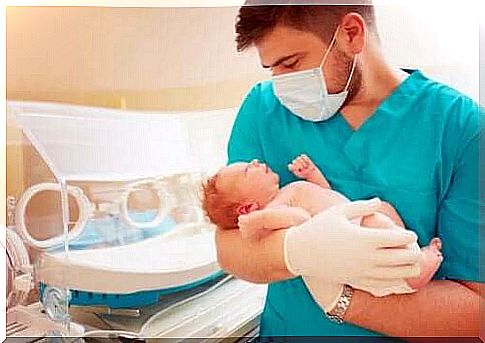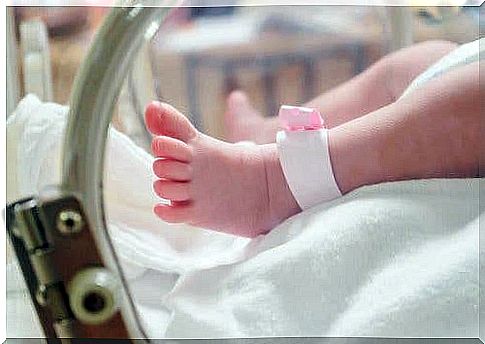How Long Does A Premature Baby Have To Stay In The Hospital?

Pre-term delivery causes a lot of stress for parents and raises many questions for them. The premature baby must stay in the hospital until his health is satisfactory. But do you know what affects the length of hospital stay? Find out by reading today’s article!
Parents often have many doubts about pre-term delivery. For example, they wonder how long a premature baby has to stay in the hospital . While every child is different and requires a personalized diagnosis, there are some general guidelines.
By reading today’s article, you will learn more about pre-term delivery and how much time a premature baby should spend in the hospital. This information will help clear up some of the doubts of parents who experience anxiety and insecurity in such a difficult situation.
Pre-term delivery
The World Health Organization (WHO) uses the term “premature baby” for babies born before 37 weeks of pregnancy. This situation can have a negative impact (both in the short and long term) on the child’s life as it is at high risk of neonatal mortality.
Here are some factors that can trigger pre-term delivery:
- Anemia,
- High levels of catecholamine in the mother’s urine,
- Tobacco consumption,
- Premature rupture of the membranes (PROM),
- Hypertension,
- Vaginal bleeding
- Urinary tract infections,
- No or insufficient prenatal care,
- If the mother is under 20 or over 35,
- Low amniotic fluid level (oligohydramnios),
- Past abortion
- Pre-eclampsia ,
- Twin pregnancy.
Caring for a premature baby in the hospital

Medical care plays a key role in the health and survival of a premature baby, as underlined by the numerous resource statistics for each country. But what care is necessary?
- First of all, immediately supporting breastfeeding and other types of feeding.
- Supervising the operation of incubators to ensure thermal equilibrium and minimize the risk of developing infections.
- Hygiene of the baby’s skin and umbilical cord.
- Respiratory support or resuscitation as needed.
- And finally, immediate treatment in the event of complications (infections, jaundice, etc.).
Moreover, nowadays, thanks to medical advances, various techniques support the bond between parents and newborns. We include, for example, kangaroo, which we will introduce below.
Kangarooing
Kangarooing is a technique used in the case of premature babies, which is based on direct contact with the mother’s skin and everything it can provide for your baby: feeding (if possible only breastfeeding), stimulation and protection. The father can also do this.
Thanks to this technique, despite being in hospital, the doctor can achieve a much more humane and natural treatment for a premature baby. His needs for temperature, food and protection are fully met. The same is true for emotional needs (security and love). At the same time, parents are able to establish an emotional bond with their child.
Kangarooing can help shorten the length of your hospital stay. In addition, parents may use this technique also after discharge for as long as necessary, depending on the child’s progress. However, always remember to consult a doctor.
How long should a premature baby stay in the hospital?

First of all, it should be emphasized that the time spent in hospital can go on indefinitely for parents, even if in fact it is very short ! After the first shock of pre-term delivery, the difficulties of daily frustration begin to increase.
However, parents need to understand that at this stage of life, the hospital is the best place for their child.
There are many factors which influence how long a premature baby must stay in hospital. These include the ability to breathe and eat, body temperature and weight gain. It is assumed that a premature baby must weigh approximately 1.80 kg before being discharged home. Most babies achieve this weight within two to four weeks.
In short, in order for a child to be able to go home, it must:
- Maintain a stable temperature without an incubator for one or two days.
- Be able to eat on your own through breastfeeding or bottlefeeding.
- Regularly gain weight until it reaches a weight of 1.80 kg.
Now you know a little more about preterm delivery and the care you should take in a premature baby. Nevertheless, remember that each child is unique and its development depends on many factors. Therefore, she must receive all the care and help she may need at all times, both physically and emotionally.









